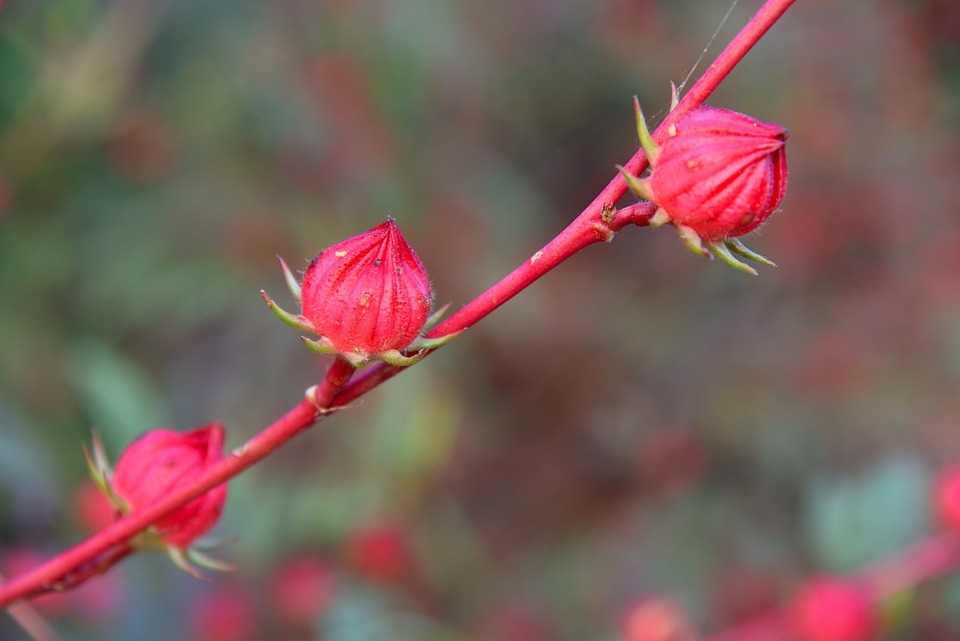The Roselle flower, also known as Hibiscus sabdariffa, is a shrub categorized under the Malvaceae family. It usually grows between one and two meters high from the ground with reddish-purple stems and green leaves. Its trumpet-shaped flowers are 7 to 8 cm across, possessing 5 pale yellow petals that fade over time into a maroon center. More than being a beautiful flower in your garden, the Roselle flower holds a multitude of therapeutic and health benefits for you and your family. Flowers provide so many benefits its hard to overstate them. If you want to know more information about the Roselle flower specifically, make sure to read further!
The uses of the Roselle flower in the ancient times
Back in the day, Roselle flowers were used as offerings to Lord Ganesha and Goddess Kali in Hindu worship. Roselle or Hibiscus is believed to incite love and attraction. In fact, women in Hawaii used to wear a single Roselle flower behind the right ear to signify singlehood. Egyptian women were not different—they were banned from drinking Roselle tea for it was said to be an aphrodisiac, thus inducing lust. This flower was mixed in incense mixtures and its petals are floated in a wooden bowl filled with water to attract positive spirits.
In Iran, Roselle tea is known as sour tea. In English-speaking countries, it is dubbed as Red Sorrel. Roselle flower used to be endemic only in African and Caribbean countries like Trinidad and Tobago and West Indies, but today, Roselle flower thrives beautifully in tropical and subtropical regions of the world, specifically in Southeast Asia and India, mostly for fiber extraction purposes.
For centuries, Roselle flowers have been used to treat urinary tract infections, toothaches, colds, and hangovers. In Senegal, this botanical item is used to treat sores, ulcers, and conjunctivitis.
The uses of Roselle flower in the modern times
The consistent results of ancient times paved the way to the knowledge we have today. Now, the Roselle flower, its leaves, seeds, and roots are utilized in traditional dishes across Africa and Asia. Its calyces are used to create red food coloring, juices, and craft drinks. A dried Roselle flower can be eaten as a fruit or used to make a soothing tea.
With its anti-aging properties, the Roselle flower has quickly gained recognition in the skincare industry. It has been utilized to develop clay masks, face/body scrubs, and other skincare products. Its antioxidant properties help fight free radicals, hence helping the skin retain its health from the inside out.
As a flower, you can expect Roselle flowers flourishing in millions of household gardens today. Its wonderful maroon color makes a beautiful decorative piece at home.
The nutritional value and medicinal benefits of Roselle flower
Roselle flowers are a rich source of essential nutrients, including calcium, niacin, vitamin C, iron, magnesium, vitamin A, vitamins B1, B2, and B3, and antioxidants. Here are some health benefits of the Roselle flower:
Antibacterial and anti-inflammatory
Roselle flower is a rich source of vitamin C, an essential water-soluble vitamin that boosts the immune system, collagen synthesis, and speeds up wound healing. With its cooling effect, it can help lessen the discomfort caused by fever.
Boosts digestion
The seed capsule inside a Roselle fruit is recognized for its tonic and diuretic properties. With these, it can aid digestion by increasing both bowel and urination movements, aid constipation, and lowering the risk of colorectal cancer.
Aids weight loss
This should be a great discovery for those who are on their weight loss journey. Did you know that hibiscus tea can speed up weight loss? Roselle extracts are known to lower the absorption of glucose and starch, hence speeding up weight loss. It hinders the production of amylase, a substance that helps starch and carbohydrate absorption. Include the Roselle flower in your weight loss regimen and you’re sure to achieve your weight goals in no time.
Antidepressant
The Roselle flower contains antidepressant properties such as flavonoids that help reduce anxiety and depression by relaxing the body and mind.
Manages cough, colds, and fever
Thanks to its vitamin C and anti-bacterial properties, Roselle tea can help treat flu symptoms such as cough, colds, and fever. Its cooling effect also helps alleviate other discomforts brought by these diseases.
Boosts liver health
Roselle flower’s antioxidant properties help get rid of toxins in the body, hence helping reduce the risk of liver diseases.

